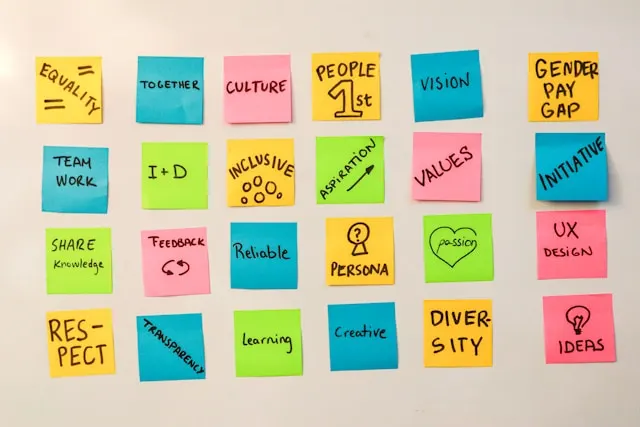50 Best Exit Interview Questions (and Tips on How to Ask Them)

An exit interview is more than just a final conversation before an employee departs; it is an opportunity for organizational growth and improvement. When conducted with care, these interviews help businesses pinpoint and address problem areas to improve their retention strategies.
In this blog, we will:
- Explain what an exit interview is
- List 50 best exit interview questions to ask departing employees
- Share additional tips on how to ask exit interview questions for maximum efficiency
Let’s get started.
What is an exit interview?
An exit interview is a formal meeting between an employee who is leaving the company and the human resources manager. It typically takes place during the employee’s final days of employment.

Exit interviews are crucial for organizations because they provide valuable information that can improve employee retention and overall workplace policies. By understanding why employees choose to leave, companies can identify problems within their organization and implement solutions to prevent future turnover. Moreover, exit interviews can help companies spot the areas they excel and build upon those strengths.
50 Best Exit Interview Questions to Ask Employees
From role-specific queries to broader cultural inquiries, the best exit interview questions encompass a variety of topics. Here are 50 thoughtfully crafted questions designed to guide organizations in collecting meaningful feedback and making informed changes.
Reasons for Leaving
First, you must understand the foundational reasons for the employee’s departure. The following questions aim to uncover those key factors.
- What was the primary reason for your decision to leave the company?
- Were there any specific factors within the company that directly contributed to your decision to leave?
- How did your experience here compare to your expectations when you joined?
- Did you have any concerns about the company’s future and stability?
- If you could change one thing about your experience, what would it be?
Role-Specific Questions
Best exit interview questions are tailored to the unique experiences and responsibilities of the employee. This will reveal a deeper understanding of how various aspects of their role impacted their overall job satisfaction and performance.
- What were the most challenging or frustrating aspects of your role?
- What were the most rewarding aspects of your role?
- Were there any specific projects or initiatives that you were particularly proud of?
- Were there any aspects of your role that you found particularly unclear or confusing?
- If you were to describe your ideal role, what would it look like?

Compensation and Benefits
While many factors contribute to an employee’s decision to leave, compensation and benefits are often at the forefront of their considerations. Gathering feedback on these elements can guide future changes that align with employee needs.
- How satisfied were you with your overall compensation package?
- Do you feel that your salary was fair and competitive compared to similar roles in the industry?
- Were there any benefits you wished the company offered that were not available?
- Were there any specific instances where you felt that your compensation or benefits were not changed or handled appropriately?
- Did you feel that the company’s compensation and benefits policies were fair and transparent?
Work-Life Balance
The significance of work-life balance is increasing as employees recognize its vital role in their wellbeing and job satisfaction. Organizations that support this balance can foster greater employee retention.
- How would you describe your overall work-life balance while working at the company?
- Were there any specific instances where you felt overwhelmed by your workload?
- Are there any policies or practices that you think could be improved to better support work-life balance?
- Did you feel comfortable discussing work-life balance issues with your manager or HR?
- Were there any company events or activities that interfered with your personal time?
Career Advancement and Development Opportunities
Career advancement and development are vital components of an employee’s experience. These questions are designed to gather insights into how well the company met expectations and where improvements can be made.
- In what ways did the company provide or not provide opportunities for your professional growth and development?
- What was your experience with mentorship and coaching opportunities within the company?
- What could the company have done differently to better support your professional development and career advancement?
- Can you describe your experience with performance reviews and how they contributed to your professional development?
- Can you describe any specific training or development programs that you found particularly beneficial?

Management Styles
Best exit interview questions recognize the critical role managers play in shaping an employee’s journey. Honest feedback can shape future improvements in leadership training and development.
- How would you describe your manager’s leadership and communication style?
- How effective was your manager in resolving conflicts within the team?
- How regularly did your manager provide constructive feedback on your performance?
- Can you tell me about your manager’s approach to delegation and task assignment?
- Were there any instances where you felt that your manager was micromanaging or overly controlling?
Company Culture
Company culture influences every aspect of the workplace. While a positive culture can attract top talent and boost retention, a negative culture can repel skilled employees and harm the company’s reputation.
- What aspects of the company culture made you feel supported and engaged?
- How inclusive did you feel the company culture was, and were there any areas for improvement?
- How well do you think the company’s values were reflected in its day-to-day operations and interactions?
- Were there any company events or activities that helped to foster a sense of community and belonging?
- How did the company handle recognition and feedback, and what impact did this have on the workplace culture?

Physical Workspace
Given that employees spend a significant amount of time in the office, the physical workspace plays a vital role in their daily routine. With the following questions, organizations can better understand how to optimize their environment for success.
- How would you describe the overall design and layout of the workspace? Did it meet your needs?
- What aspects of the physical workplace did you find most supportive of productivity?
- Did you have access to quiet spaces or meeting rooms when you needed them? If not, how did that affect your work?
- How well did the physical workspace support collaboration and teamwork among your team?
- What changes would you recommend for the physical workspace to improve comfort and efficiency for future employees?
Technology and Tools
The right technology and tools can make all the difference in job performance and satisfaction, especially for remote employees. Ask these questions to evaluate how meaningfully these resources support work experience.
- How effective were the tools and technology provided by the company in helping you perform your job duties?
- Did you encounter any challenges with the tools or technology provided? If so, can you describe them?
- How well did the company support your training and development in using technology and tools?
- Were there any tools or technologies that you wished the company had implemented to enhance your work experience?
- Did you have any concerns about the security and privacy of the company’s technology systems?
Rewards and Recognition
The lack or inconsistency of recognition and rewards can undermine employee engagement and loyalty. Best exit interview questions foster open dialogue about the fairness of these programs.
- How well did the company communicate its rewards and recognition program to employees?
- Were there any specific types of rewards or recognition that you found particularly motivating or meaningful?
- Can you share any specific instances where you felt appreciated for your work?
- Were there any specific instances where you felt that your performance was not recognized or rewarded appropriately?
- Did you feel that recognition was distributed fairly among team members? Why or why not?
How to Ask Exit Interview Questions: Best Practices
Asking the right questions is just as important as how you conduct the interview itself. These exit interview tips will help you develop a thoughtful process that not only collects essential information but also respects the employee’s perspective.

- Create a comfortable environment. Choose a private space free of distractions, where the employee can feel secure sharing their thoughts and experiences. Consider factors such as seating arrangements, lighting, and refreshments to help set a relaxed atmosphere.
- Ask open-ended questions. This will prompt employees to elaborate on their feelings, leading to insights that may not surface with yes-or-no questions. It will also bring underlying issues to light that may not be immediately apparent.
- Adopt a neutral tone. A non-judgmental attitude will encourage the employee to be open and honest, without the fear of being criticized and judged. Avoid making assumptions or expressing opinions that could make the employee feel defensive or uncomfortable.
- Focus on specific experiences. Ask the employee to share particular instances that shaped their perceptions of the company, their role, or their team. For example, instead of asking “How did you feel about your experience working here?”, ask “Can you describe a specific time when you felt particularly supported or valued by your team?”
- Record and transcribe the exit interview. By capturing the conversation, you can focus on actively listening to the employee rather than taking extensive notes. Keep in mind that it’s important to obtain the employee’s consent, ensuring transparency and respect for their privacy.
Transcribe an Exit Interview Now
Frequently Asked Questions
How many questions should be in an exit interview?
This depends on the time available as well as the depth of feedback you’re seeking. Your goal must be to gather valuable insights without overwhelming the employee. Therefore, 10-15 questions can strike the right balance.
Who is the best person to do an exit interview?
The best person to do an exit interview is typically someone from the Human Resources department. It can also be a neutral third party, such as an external consultant, who can provide an unbiased perspective. While the first option knows the company better, the latter can lead to a more impartial process. Both approaches have their own pros and cons.
How can I start an exit interview?
If you’re conducting an exit interview, start by thanking the employee for their contributions to the company. Clearly restate the purpose of the interview, and assure the employee that their input is valuable and confidential. Begin with broader open-ended questions, such as “What motivated your decision to leave?”, and move on to more specific questions as the meeting progresses.
What should I ask my interns when they leave?
Best exit interview questions for interns focus on their unique experiences. For example, you can ask “What did you most enjoy about your internship?”, or “What were the most challenging aspects of your internship?” Other good questions include “Did you feel adequately supported by your manager and team?”, “How well did your tasks align with your career goals?”, and “Would you recommend this internship to others, and why?”
Summary
This blog shared 50 best exit interview questions in ten categories ranging from work-life balance to compensation and benefits. It also guided you on how to ask these questions, as your attitude can greatly impact the quality of the responses you receive.
During an exit interview, always remember to:
- Ask open-ended, role-specific questions to gain richer insights into employee experience.
- Maintain an unbiased tone to create a safe space and encourage honest feedback.
- Document the conversation with permission to inform future strategies for employee retention.
Keep these three golden rules in mind and you’ll be better positioned to turn exit interviews into actionable improvements for your organization.

